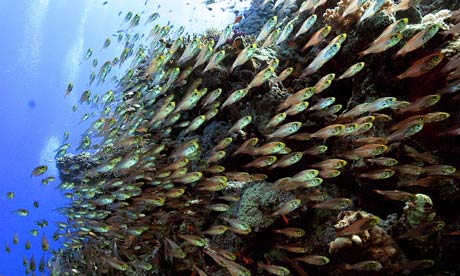Ocean acidification rates pose disaster for marine life, major study shows
Report launched from leading marine scientists at Copenhagen summit shows seas absorbing dangerous levels of CO2 
By Severin Carrell
www.guardian.co.uk, Thursday 10 December 2009 10.52 GMT The world’s oceans are becoming acidic at a faster rate than at any time in the last 55m years, threatening disaster for marine life and food supplies across the globe, delegates at the UN climate conference in Copenhagen have been warned. A report by more than 100 of Europe’s leading marine scientists, released at the climate talks this morning, states that the seas are absorbing dangerous levels of carbon dioxide as a direct result of human activity. This is already affecting marine species, for example by interfering with whale navigation and depleting planktonic species at the base of the food chain. Ocean acidification – the facts [pdf] says that acidity in the seas has increased 30% since the start of the industrial revolution. Many of the effects of this acidification are already irreversible and are expected to accelerate, according to the scientists. The study, which is a massive review of existing scientific studies, warns that if CO2 emissions continue unchecked many key parts of the marine environment – particularly coral reefs and the algae and plankton which are essential for fish such as herring and salmon – will be “severely affected” by 2050, leading to the extinction of some species. Dr Helen Phillips, chief executive of Natural England, which co-sponsored the report, said: “The threat to the delicate balance of the marine environment cannot be overstated – this is a conservation challenge of unprecedented scale and highlights the urgent need for effective marine management and protection.” Although oceans have acidified naturally in the past, the current rate of acidification is so fast that it is becoming extremely difficult for species and habitats to adapt. “We’re counting it in decades, and that’s the real take-home message,” said Dr John Baxter a senior scientist with Scottish Natural Heritage, and the report’s co-author. “This is happening fast.” The report, published by the EU-funded European Project on Ocean Acidification, a consortium of 27 research institutes and environment agencies, states that the survival of a number of marine species is affected or threatened, in ways not recognised and understood until now. …
Ocean acidification rates pose disaster for marine life, major study shows